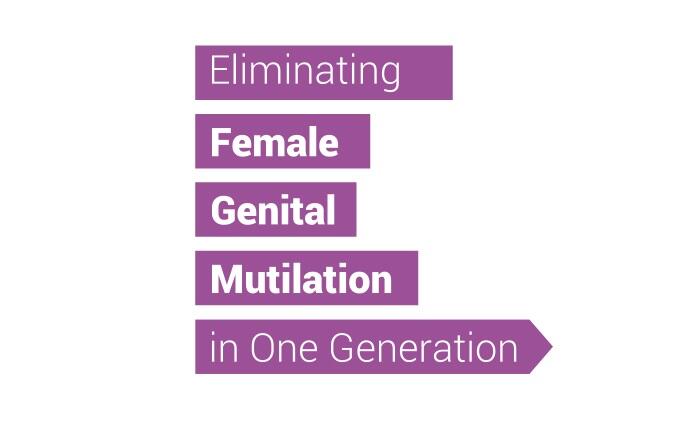14th November 2017 – Accra, Ghana: The United Nations Population Fund (UNFPA), in close partnership with the African Union Commission (AUC) and the Ministry of Gender, Children and Social Protection of the Republic of Ghana, is convening a High Level Ministerial Meeting on Female Genital Mutilation on 15th and 16th November 2017. The meeting forms part of the 2017 commemorations of the Campaign on Accelerated Maternal Mortality in Africa (CARMMA) Week in Accra, Ghana from 13th to 17th November 2017.
H.E. The First Lady of the Republic of Ghana, Mrs. Rebecca Akufo-Ado is the Guest of Honour for this high level meeting, with Ministers responsible for gender and health from 16 African countries (Burkina Faso, Djibouti, Uganda, Egypt, Ethiopia, Eritrea, Gambia, Guinea, Guinea-Bissau, Kenya, Mali, Mauritania, Nigeria, Senegal, Sudan, Somalia) and the African Union Commission’s Commissioner for Social Affairs, H.E. Mrs. Amira ElFadil in attendance. Also expected at the meeting are representatives from the different United Nations agencies including UNFPA, UNICEF and UNAIDS, international organisations and civil society organisations from across Africa.
The high level meeting on Female Genital Mutilation is convened at a time when there are renewed calls for political commitment in Africa to eliminate all harmful practices and gender based violence. The United Nations Commission on the Status of Women (CSW) passed resolution E/CN.6/2008/L.2/Rev.1 in 2008 calling for the ban of Female Genital Mutilation. This was reinforced by the United Nations General Assembly resolutions A/RES/67/146 (2012) and A/RES/69/150 (2014) calling for the total ban and intensified efforts to eliminate female genital mutilation. In Africa, call for a ban on female genital mutilation are echoed in important regional legal instruments including the African Charter on the Rights and Welfare of the Child – 1990, the African Charter on Human and People’s Rights – 1981, and its Protocol related to the Rights of Women in Africa – the Maputo Protocol – 2003.
Why the focus on Female Genital Mutilation?
More than 200 million women worldwide have experienced some form of female genital mutilation. 3.5 million girls and women are at risk annually and more than 57 million will be at risk of undergoing FGM by 2050 if the world continues with business as usual. According to UNFPA, 14.8 million girls 15 – 19 years in Africa are projected to undergo female genital mutilation by 2020 if current trends continue. However, if action is taken now – about 4 million girls can be saved from female genital mutilation by 2020 on the continent.
About 1 in 5 girls who have been subjected to FGM had the procedure performed by a trained medical professional. In some countries, this number is as high as 3 in 4 girls. Medicalisation of female genital mutilation is a growing problem that needs urgent action by the medical fraternity across all countries. According to the World Health Organisation, FGM medicalisation is when health providers perform the excisions.
Female Genital Mutilation has no known health benefits to women. From partial and total removal of the clitoris to sewing of the vaginal opening or infibulation – female genital mutilation only leaves lifelong problems for girls and women, and these include gynaecological, obstetric and psychological complications, and in addition, the practice is a total violation of girls and women’s sexual and reproductive health rights.
Urgent Action Needed
The High Level Ministerial meeting on Female Genital Mutilation in Accra, Ghana on 15th and 16th November 2017 will be calling for accelerated efforts to eliminate harmful practices in Africa as a means to delivering on the sustainable development agenda (sustainable development goal 5, target 5.3, which calls for the elimination of harmful practices, including FGM) and Africa’s Agenda 2063 (aspiration 6, priority 6.1.2 calling for the elimination of all gender based violence, including FGM).
This meeting is part of support provided by the UNFPA-UNICEF Joint Programme on the Elimination of Female Genital Mutilation: Accelerating Change. The programme was first launched in 2008. It focuses on 16 countries in Africa to eliminate female genital mutilation in one generation. The programme supports Governments, civil society organisations and networks in the countries to galvanise policy, political and community action to end the practice.
For more information, please contact:
1. Seynabou Tall, UNFPA East and Southern Africa Regional Office
tall@unfpa.org; +27 11 603 5337
2. Doris Mawuse Aglobitse, UNFPA Ghana Country Offfice
aglobitse@unfpa.org; +233204545666
3. Robert Kasenene, UNFPA Liaison to AU and UNECA
kasenene@unfpa.org; +251 115 444406



